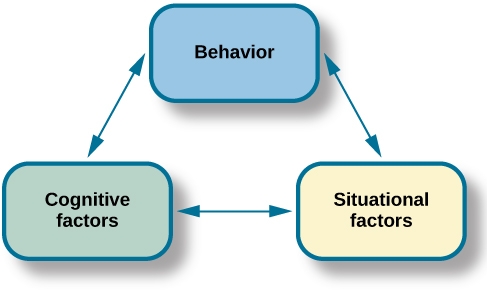Describe the Social Cognitive Perspective on Personality
Social cognitive theory is a learning theory developed by the renowned Stanford psychology professor Albert Bandura. He presented a social-cognitive theory of personality that emphasizes both learning and cognition as sources of individual differences in personality.

Social Cognitive Perspectives On Personality Boundless Psychology
These cognitive cycles add to learned practices that are key to ones personality.

. State the social-cognitive perspective on personality and describe the concepts proposed by the two most influential theorists in this field. Bandura pointed out that. And c the influence.
In Banduras experiment children were shown a video of an adult hitting kicking and tossing a life. Experts are tested by Chegg as specialists in their subject area. The theory provides a framework for understanding how people actively shape and are shaped by their environment.
Describe the social cognitive perspective on personality. The unique feature of SCT is the emphasis on social. B the content and structure of social knowledge.
The Social Cognitive Theory. The Social Cognitive Theory of Personality. The basic goal of a social cognitive perspective is to understand how individuals make sense of themselves others and events in everyday life.
The social-cognitive perspective applies principles of learning cognition and social behavior to personality with particular emphasis on the ways in which our personalities influence and are influenced by our interaction with the environment. In contrast to the psychodynamic approaches of Freud and the neo-Freudians which relate personality to inner and hidden processes the learning approaches discussed in this section focus only on observable behaviour. Social Cognitive Personality Theories.
Using a social-cognitive perspective researchers can study a wide range of topics including attitudes person-perception prejudice stereotypes self-concept discrimination persuasion decision-making and. These cognitive processes contribute to learned behaviors that are central to ones personality. Reciprocal determinism refers to the interacting influences between personality and environmental factors.
The social cognitive perspective of personality theorizes that human personality is an ever-changing amalgamation of the choices we make based on how we think about and judge the actions of others. Social cognitive theory explains psychosocial functioning in terms of triadic reciprocal causation Bandura 1986. According to the theory it articulates that Personality is something that an individual can learn from people.
Social Cognitive Theory SCT started as the Social Learning Theory SLT in the 1960s by Albert Bandura. These perspectives suggest that personality coherence is a many-sided problem Allport 1937 entailing a consensually perceived configuration of trait attributes the multivariate perspective an integrated ie noncompartmentalized self-concept the social cognitive-perspective a system of coordinated and reciprocally facilitating. This illustrates a significant advantage of the learning approaches over psychodynamics.
In social-cognitive theory the concepts of reciprocal determinism observational learning and self-efficacy all play a part in personality development. In contrast to the psychodynamic approaches of Freud and the neo-Freudians which relate personality to inner and hidden processes the learning approaches focus only on observable behavior. 1 Definition of Social Cognition.
The social-cognitive perspective applies principles of learning cognition and social behavior to the understanding of personality. Identify the strenghts and weaknesses of the theory Brief background on Bandura Born in Alberta Canada in 1925 Doctorate at. In particular the theory details the processes of observational learning and modeling.
Apply the concept of reciprocal determinism. The Social Cognitive Perspective of personality also ignores the _____ influences emotions and conflicts present in other theories. The social-cognitive perspective on personality is a theory that emphasizes cognitive processes such as thinking and judging in the development of personality.
Click to see full answer. Social cognition is not simply a topic within social psychologyit is an approach to studying any subject with social psychology. Social-cognitive perspective on personality is a hypothesis that underlines cognitive cycles like reasoning and deciding in the improvement of personality.
According to the theory individuals are social things That can learn from the environment. Reciprocal By emphasizing the ________ interaction of mental behavioral and situational factors the Social Cognitive Perspective on personality recognized the complex combination of factors that influence our. In this model of reciprocal causality internal personal factors in the form of cognitive affective and biological events.
The term causation is used to mean functional dependence between events. We review their content and use your feedback to keep the quality high. In his social cognitive theory of personality Bandura included the concept of observational learning as one of the main theoretical points.
He argued that reinforcement does not simply work as a mechanism but it is actually the provider of information of the next reinforcement to be given once the behavior is repeated. Social Cognitive Theory of Personality describe the Social Cogntive Theory. It developed into the SCT in 1986 and posits that learning occurs in a social context with a dynamic and reciprocal interaction of the person environment and behavior.
Also know what is the cognitive theory of personality. By this it means that people can learn what is good and resist that which is terrible. Developed over nearly five decades by Albert Bandura social cognitive theorywhich emphasizes the reciprocal interaction of behavior cognitive and other personal factors and environmental influences on human functioninghas been carefully derived from empirical findings and subjected to repeated tests within many areas of human.
These goals are reflected in the study of a cognitive mechanisms that may explain social cognitive processes as illustrated above. Updated on January 20 2019. Describe the social cognitive perspective on personality.
Social cognitive theory has its roots in a famous experiment done by Albert Bandura in 1961. This illustrates one significant advantage of the learning approaches over psychodynamics.

Social Cognitive Perspectives On Personality Boundless Psychology

No comments for "Describe the Social Cognitive Perspective on Personality"
Post a Comment